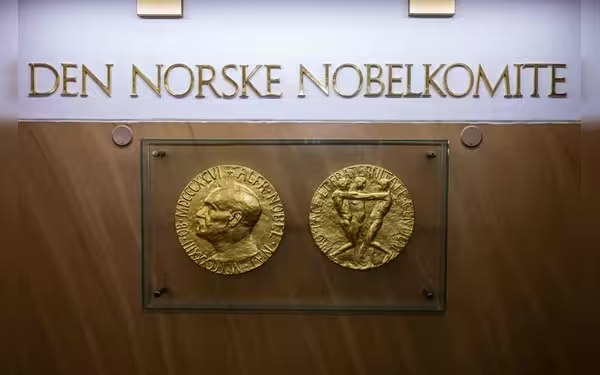Saturday, November 16, 2024 05:27 PM
Nobel Prizes Announced Amid Global Conflicts and AI Advancements
- Nobel Peace Prize faces scrutiny amid global violence.
- Potential nominees include grassroots organizations in the Middle East.
- AI advancements may be recognized in upcoming prize categories.
 Image Credits: arabnewspk
Image Credits: arabnewspkNobel Prizes to be announced next week amid wars, famine, and AI advancements, raising questions about the Peace Prize's relevance.
The Nobel Prizes, a prestigious set of awards recognizing outstanding contributions in various fields, are set to be announced next week. This year, the backdrop against which these awards will be presented is particularly somber, marked by ongoing wars, a refugee crisis, famine, and the rapid rise of artificial intelligence. The timing of the announcements coincides with the anniversary of the Hamas-led attacks on Israel, which have sparked a year of violence and conflict across the Middle East.
While the literature and science prizes may remain unaffected by the current global turmoil, the Nobel Peace Prize faces a unique challenge. This award is traditionally given to individuals or organizations that have made significant efforts to promote peace and resolve conflicts. However, with the world witnessing escalating violence, some experts are questioning whether this is the right time to award the Peace Prize at all.
Dan Smith, the director of the Stockholm International Peace Research Institute, expressed his concerns, stating, "I look at the world and see so much conflict, hostility, and confrontation. I wonder if this is the year the Nobel Peace Prize should be withheld." He highlights the ongoing conflicts in Sudan and Ukraine, as well as the alarming increase in global military spending, which is reportedly rising at its fastest pace since World War II.
Historically, the Nobel Peace Prize has been withheld on 19 occasions, including during the world wars. The last time it was not awarded was in 1972. However, Henrik Urdal, director of the Peace Research Institute Oslo, argues that withholding the prize in 2024 would be a mistake. He believes that the award is crucial for promoting and recognizing important work aimed at fostering peace.
Several grassroots organizations and international groups working to alleviate violence in the Middle East could be potential nominees for the Peace Prize. Although nominees are kept secret for 50 years, some nominators choose to publicize their selections. For instance, academics at the Free University Amsterdam have nominated organizations such as EcoPeace, Women Wage Peace, and Women of the Sun for their efforts to promote peace between Israelis and Palestinians.
Additionally, Urdal suggests that the committee might consider the Sudan Emergency Response Rooms, a group of grassroots initiatives providing aid to those suffering from famine and the brutal civil war in Sudan. The Nobel Prize announcements will begin on Monday with the physiology or medicine prize, followed by awards in physics, chemistry, literature, and peace on subsequent days. The Peace Prize will be announced on Friday by the Norwegian Nobel Committee in Oslo, while the Royal Swedish Academy of Sciences will announce the other prizes in Stockholm. The economics prize will be revealed the following week on October 14.
This year, there is also a possibility that new technologies, particularly artificial intelligence, could be recognized in one or more categories. Critics of AI warn that the rise of autonomous weapons could lead to further conflict and suffering. However, AI has also facilitated significant scientific advancements that may be acknowledged in other prize categories.
David Pendlebury, head of research analysis at Clarivate’s Institute for Scientific Information, notes that scientists from Google DeepMind, an AI lab, could be contenders for the chemistry prize. Their AI program, AlphaFold, is capable of accurately predicting protein structures and is already being utilized in various fields, including medicine, where it may help develop breakthrough drugs in the future.
As the world awaits the Nobel Prize announcements, it is essential to reflect on the broader implications of these awards. They not only celebrate individual achievements but also shine a light on pressing global issues. In a time of conflict and uncertainty, the recognition of efforts towards peace and innovation can inspire hope and encourage further action. The upcoming announcements will undoubtedly be a moment of both celebration and contemplation, reminding us of the ongoing struggles and the potential for positive change in our world.













